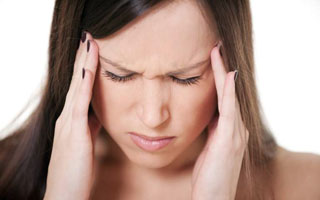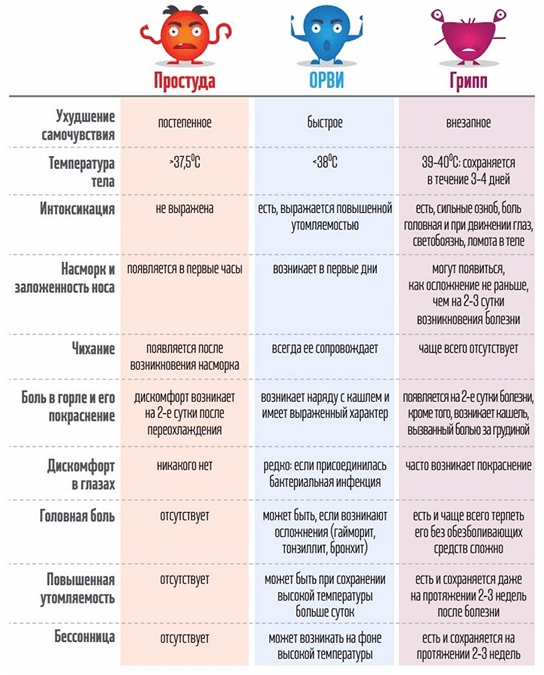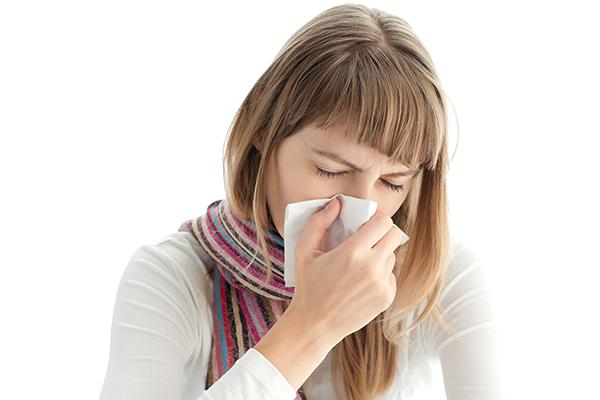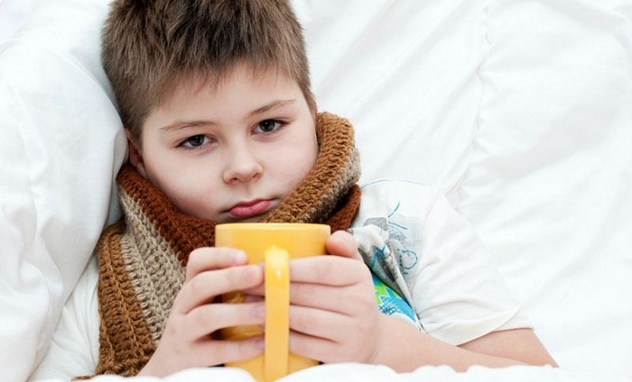Headaches are frequent companions of many diseases, especially those associated with the respiratory system. The flu is also accompanied by pain in the head, which can be weak, spinning, hurt in certain areas. If during the flu headaches are natural due to the body's reaction to a viral pathogen, then after the illness has passed, this symptom should disappear. If you have a headache after the flu, then you should take additional treatment.
Usually, after the elimination of the virus that provoked the flu, other symptoms also disappear. At the end of the illness, the person feels great, and his head should not bother him. However, the appearance of severe pain and dizziness may indicate the development of another illness or complications after the flu. The site site recommends contacting a doctor if severe headaches remain after the flu in order to undergo additional diagnostics and identify the cause in time.
If painkillers do not work, and other symptoms also occur, this clearly indicates the presence of some kind of disease. What could it be?
Arachnoiditis as the cause of pain in the head after the flu
If viral infections after influenza, scarlet fever, measles and other diseases affect the arachnoid membranes of the brain or spinal cord, then arachnoiditis may be the cause of pain in the head. This disease is characterized by a thickening of the connective tissue of the arachnoid, in which adhesions and cysts appear, filled with a transparent or cloudy liquid.
Symptoms of arachnoiditis as a complication after suffering the flu are:
- Headache worse after exercise and in the morning.
- Vomiting and nausea.
- Decreased memory.
- Dizziness.
- Irritability and apathy.
- Sleep disturbance.
- Signs of intoxication: fatigue, increased sweating, weakness.
- Possibility of epileptic seizures.
Treatment of arachnoiditis is complex and lengthy, which primarily depends on the causes of its occurrence (type of virus). The main therapies are desensitizing, antibacterial and antihistamine. Contacting a doctor should be urgent, as the disease can lead to death.
Although headaches are a symptom, they indicate the development of an inflammatory process in the ear, head, and sinuses. Influenza is dangerous not in itself, but in its complications.
Meningitis as a possible complication after the flu
Another dangerous possible complication after the flu is meningitis, which develops in 99% of cases if a person is not vaccinated against it. This disease manifests itself in inflammatory processes occurring in the meninges.

The main symptoms of meningitis are:
- Violation of consciousness.
- Severe pain in the head.
- Inability to tilt the head forward (pain in the neck) due to the sensations.
- Photophobia.
- Sensitivity to sounds and touch.
The disease is noted by the fast progressing character. If a person is self-medicating and does not go to doctors, then the risk of death increases. Therefore, if you experience headaches after the flu, you should immediately seek medical help. If meningitis is detected, intensive and emergency therapy will be carried out. The first time treatment consists in taking antibacterial and antiviral drugs. With timely treatment, the forecasts are comforting.
The main reason for the development of meningitis after the flu is self-medication of the first illness. The main prevention of complications is vaccination.
Headache after flu with sinusitis
A common type of complication after the flu is sinusitis - inflammation of the paranasal sinuses. There are several types of them, each of which can provoke a symptom when the head hurts.
![]()
The main symptoms of all types of sinusitis are:
- Pain in the head.
- Pain in the eyes, bridge of the nose, above the eyes, nose, which depends on the localization of the inflammatory process.
- Difficulty breathing, speaking through the nose.
- Purulent or clear discharge from the nose, depending on the stage of the disease.
- fatigue.
- Lack of appetite.
- Temperature increase.
- Sleep disturbance.
The pain usually increases in the evening, as well as when tilting the head. After contacting a doctor, an x-ray, CT and ultrasound are prescribed. Treatment is aimed at eliminating infection, swelling and all pain symptoms. For this, antibacterial drugs, vasoconstrictor drugs and physiotherapy are prescribed.
Doctors do not advise delaying treatment and not self-medicating with sinusitis. In severe cases, drug therapy does not work and you have to resort to surgical intervention. The main complications of sinusitis are osteomyelitis, neuritis, and meningitis.
Possible complications after the flu - otitis media
Otitis media are common diseases of childhood. The child is sick not only with the flu, but also with its possible complication - otitis media. This often happens in situations where the parents themselves treat the underlying disease. However, doctors warn that such measures can lead to an even greater deterioration in health - the development of heart defects.

After the flu, otitis media may develop due to a significant decrease in immunity, which allows viruses to penetrate the mucous membrane of the ear canal. The development of otitis is accompanied inflammatory processes and swelling, which provokes a headache and other symptoms:
- Pain in the jaw.
- Possibility of temperature increase.
The best treatment is to contact an ENT doctor and follow all his recommendations. You can supplement the treatment with the following procedures:
- Do warm compresses throughout the day.
- Bury ears with specially designated alcohol drops 2 times.
- Monitor your health and consult a doctor periodically.
Self-treatment should be excluded. In some cases, doctors recommend hospitalization in order to constantly monitor the patient's condition. This advice should be heeded, otherwise complications of otitis media may develop:
- Rupture of the tympanic membrane.
- Hearing loss.
- Exudative otitis.
- Complete deafness.
Other Causes of a Headache After the Flu
Other causes of headache after the flu, which are also often noted, have not been considered:
- Lung disease - pneumonia.
- Diseases of the heart and blood vessels: pericarditis, myocarditis.
- downgrade blood pressure or poor circulation, preventing the brain from getting enough oxygen.
- Postviral asthenia.
Post-viral asthenia seems to be a non-serious condition when a person simply feels a breakdown, headache, fatigue and drowsiness. However, the lack of any treatment leads to the fact that it develops into a serious illness.
Doctors say that the head should not hurt if a person has recovered from the flu. This symptom most often indicates the development of a complication that only a doctor can identify. It is better not to delay treatment and consult a doctor in time to confirm or refute the post-influenza complication.
Forecast
Influenza is a viral disease, the treatment of which should already be under the supervision of a doctor. Forecasts are favorable if the patient is vaccinated and undergoes all medical activities and procedures. Otherwise, complications after the flu, which manifest themselves in a headache, are not uncommon.
To improve your condition and quickly return to normal after suffering the flu, the following measures are offered:
- Outdoor activities and walks.
- The use of fresh vegetables and fruits, seafood and seaweed, onions and garlic, as well as food, rich in vitamin C. Exclusion at the same time of fried and fatty foods, pasta, pickles, confectionery, smoked meats.
- Quit smoking and alcohol.
- Doing what you can physical activity and charging.
- Plentiful drinking of various juices, compotes, mineral water, etc.
All measures are good if every day a person feels much better. If the condition is accompanied by increased headaches, fever and occasional dizziness, then you should consult a doctor. This measure will help to avoid negative complications that are much more difficult to treat than a simple flu.
- Arachnoiditis can cause headaches after the flu
- What are the complications of the flu?
- Headache after flu with sinusitis
- Possible complications after the flu - otitis media
Many are concerned about the question - why does the head hurt after the flu. It would seem that the disease is cured, but the head is still spinning and it hurts. This can be a sign of serious illness, so you can’t delay visiting a doctor.
A headache with the flu is the body's response to the action of viruses, but after a complete cure, no pain should not occur.
Some try to relieve the headache with analgesics, but sometimes this only helps for a while, and then the pain returns again. It should be understood that pain medications will not eliminate the cause of the pain, which may be a symptom of a serious illness.
Arachnoiditis can cause headaches after the flu
Almost always, sinusitis is accompanied not only by a headache, but also by fever, lack of appetite, fatigue, sleep disturbance. The disease is diagnosed on the basis of x-ray data, ultrasound, computed tomography. The main goal of sinusitis treatment is to reduce pain, remove swelling and eradicate the infection. For this, antibacterial drugs, physical procedures, vasoconstrictor drugs are prescribed.
In cases where, after the flu, the head hurts badly, the discharge from the nose is purulent and drug treatment gives practically no results, doctors use surgical operation. Sinusitis is a complication after the flu, which, if not treated in time, can cause meningitis, neuritis, and osteomyelitis. Therefore, doctors do not recommend delaying treatment.
Headache with influenza is one of its main symptoms. Usually it is a companion of high body temperature and occurs due to the ingestion of pathogenic viruses into the human body. In what and what treatment to choose?
Very often, people with symptoms such as fever, muscle and headache, doctors diagnose SARS. This disease develops when a virus enters the body or when bacterial infections are complicated. The disease begins to develop against the background of reduced immunity or after hypothermia of the body. If the immune system works well, then the disease will be mild. But for a child and an elderly person, the flu can be very dangerous. For such groups of patients, doctors recommend getting vaccinated against influenza before the start of the epidemic season and starting treatment as early as possible in case of illness.

As a rule, the patient will feel the first signs within 12-24 hours after the virus enters his body. At the same time, he has the following symptoms that distinguish the flu from the common cold:
- The temperature rises sharply, which can often exceed the readings of 40 degrees.
- Arises.
- Mucous membranes dry out respiratory tract both upper and lower, so a person complains of dryness in the nose and sore throat. The patient begins to cough and very soon it develops into an intense cough.
- Sometimes there is noise in the ears.
In order to recognize the disease in time, it is better to know its symptoms. Says the doctor of the 1st category Maslennikova Anna:
Why does the flu cause headaches?
As a rule, a headache with the flu occurs due to the entry of bacteria into the body, which the human immune system begins to actively fight. At the same time, unpleasant sensations are accompanied by chills and high fever, due to the fact that there is vasodilation and an increase in intracranial pressure, which causes a headache with the flu.
Why does my head hurt when I have a cold
When a runny nose and sneezing join other symptoms, this further increases the pressure inside the vessels. In this case, the pain can be concentrated in the area of \u200b\u200bthe eyes and temples. Painkillers help relieve discomfort for a short time. Such a headache has its own characteristics:
- Occurs after hypothermia;
- Accompanied by intense runny nose;
- Painful sensations can be localized in a certain place: presses the back of the head, shoots in the ears, hurts the eyes, etc.;
- It is especially strong;
- Unpleasant sensations are aggravated by sneezing, or simply moving the head.

What medicine to drink to eliminate pain, the doctor will tell, having studied the symptoms.
Flu in a child
For a child during an illness, a headache is characteristic, which occurs simultaneously. If you drink antipyretic medicine, then it also disappears. However, it is important to remember that taking such drugs is recommended only when the temperature value has exceeded 38 degrees. But there may be exceptions, depending on the specific situation and the characteristics of the child's body.
A small video in which Dr. Komarovsky is a pediatrician, candidate medical sciences, the author of popular books and television programs on children's health, will fully answer the question of how to treat influenza in a child:
During the flu and colds, the child needs to drink more and more often. For this, cranberry juice, herbal tea, raspberry tea, dried fruit compote and rosehip broth are suitable. This will help reduce the temperature, and, accordingly, cope with the headache that always accompanies the flu and SARS.
Rubs and cold compresses applied to the forehead can also be used to relieve severe headaches and reduce fever.
In addition, there are other symptoms:
- Fast fatiguability;
- muscle weakness;
- Chills;
- Dry cough;

Everything you need to treat flu in a child: bed rest, plenty of fluids, a humid and ventilated room
- Dryness in the nose;
- Sore throat;
- Unpleasant sensations in the stomach;
- Nausea and vomiting.
How to deal with a headache during the flu
When a severe headache occurs, you need to drink any pain medication. Today, in pharmacies, you can find many drugs that can eliminate not only discomfort in the head and lower body temperature, but also actively fight the viruses that caused the disease. And since a headache is only a symptom of the underlying disease, in order to get rid of it, it is necessary, first of all, to provide treatment for the underlying cause of this condition.
Folk ways
Often during colds and flu are effective folk methods treatments to help relieve headaches:
- Plentiful drink and bed rest.
- Head massage, special attention should be paid to the temporal region.
- Regular ventilation of the room will prevent the spread of pathogenic microbes.
The opinion of a general practitioner with 20 years of experience Skachko Boris on the treatment of influenza:
- Soreness can be relieved by menthol oil, which is applied in small amounts to the temples, forehead and back of the head.
- Peel or lemon slices applied to the temples.
- The use of echinacea tincture, which will not only relieve you of discomfort, but also help strengthen the immune system.
- Do a finger massage.
Everyone knows that any disease is better to prevent than to treat it later. What you need to do to prevent infection with the virus:
- Avoid places where a large number of people are concentrated, especially during periods of epidemics.
- When you get home, be sure to wash your hands with detergents. It is recommended to rinse the nose with special saline solutions or dissolved in warm water sea salt.
- Before you leave the house, lubricate your nose with oxolin ointment.

- Open windows frequently to ventilate the room you are in. The flu virus does not like moisture and cool air, therefore, in addition to ventilation, it is recommended to humidify the air in the room. To do this, you can use special devices or simply arrange containers with water.
- Before the onset of an epidemic of viral diseases, doctors recommend getting vaccinated against the flu.
When you find the first signs of the disease, you need to urgently begin treatment. Only in this case you can achieve a quick recovery and prevent complications.
Headache after recovery
Sometimes patients complain that their head hurts after the flu. What could be the reason? This condition may indicate the following diseases:
- Arachnoiditis - inflammation of the meninges (more on).
- Sinusitis is an inflammation that affects the sinuses.
- Otitis media is an inflammation of the ear. Most often, otitis media can occur in children.
Each of these complications requires timely treatment.
To protect yourself from the unpleasant symptoms of viral infections and related complications, doctors recommend that you do not neglect the rules of personal hygiene and get vaccinated against the flu. This will help prevent infection and headaches.
Frequent dizziness and acute pain in the head are characteristic symptoms of most viral infections, including influenza. These symptoms cause significant discomfort during the development of the disease. A striking example of such a pathology can be dizziness with a cold. However, in most cases, at the end of the acute period of influenza, they almost completely disappear.
After elimination of pathogens in the body, in most cases, the patient returns to an active lifestyle and the performance of his duties at work. But what if, after discharge, the headache after the flu remains and continues to annoy the person? Moreover, dizziness and other unpleasant symptoms appear at the same time? About what is the cause of this condition and how to avoid complications after the flu and will be discussed further.
Causes of pain in the head after the flu
Viruses and microorganisms that cause acute respiratory diseases provoke the development of two dangerous pathologies in the human body - intoxication and catarrhal changes.
The first are manifested when the body is poisoned by toxins that the virus releases in the course of its life. Once in the blood, toxic substances act on receptors, causing muscle and headaches. Among side effects this process can be distinguished:
- weakness;
- dizziness;
- cardiopalmus;
- nausea;
- chills;
- nervous tension.
The development of catarrhal changes provokes inflammatory processes:
- ENT organs (otitis media, sinusitis, sinusitis);
- lungs (pneumonia);
- brain tissue (meningitis, arachnoiditis);
- cardiovascular system (myocarditis, pericarditis).
Frequent dizziness may be associated with insufficient blood circulation and a decrease in pressure due to blockage or partial blockage of the lumen of the upper respiratory tract. As a result, brain cells suffer from a lack of oxygen and nutrients. This condition can cause frequent fainting and prolonged loss of consciousness.
If headaches after the flu do not go away within a week, you should definitely consult a doctor. Such a symptom may indicate the development of a dangerous pathology in the body caused by a bacterial or viral infection.
Postviral asthenia
It is no secret that adults and children tolerate the flu, SARS or acute respiratory infections differently. And each body fights infection in its own way. Therefore, for some people, the flu is another reason to stay at home for a week. The disease passes without any complications, pain and consequences. For other patients, the flu is a real disaster with pronounced symptoms, high fever and mandatory complications.
Many people who have had the flu continue to suffer from constant fatigue, drowsiness, headaches and muscle pain for several weeks. Constant dizziness after the flu, lack of vitality and permanent depression do not allow the recovered person to fully enjoy life. Doctors call this condition post-viral asthenia and recommend treating it like any other disease.

Post-viral asthenia is dangerous because serious complications or chronic illnesses can develop against its background. After all, their symptoms can be similar in many respects, and diseases can be recognized only after a thorough examination.
Features of treatment
Headache and dizziness do not require separate treatment, as they are signs of other diseases. During the flu, these symptoms subside along with the activity of disease-causing viruses.
So what should you do if you have a severe headache after the flu? If dizziness or pain appears as an isolated case, then you can take painkillers - Analgin, Aspirin, Ibuprofen or Paracetamol. In a situation where, with pain in the head, there is a change blood pressure- recommended to take medicinal product to normalize it.
Chocolate, tea with wild rose, chokeberry, chicory or viburnum can be used as aids. Additionally, you can take herbal infusions of mint, chamomile, lemon balm, motherwort, hawthorn. Drinking plenty of water will quickly remove toxins from the body, herbs will calm the nervous and cardiovascular systems, and berries will saturate the body with trace elements and vitamins.
Recovery of the body after the flu
If you periodically feel dizzy after the flu, weakness is felt throughout the body and headaches bother you, you can apply a few simple methods to overcome the consequences of the disease:
- eat more fresh vegetables and fruits, lean meats, sea fish, mushrooms and legumes. You can eat chicken or quail eggs, nuts, seeds, fish caviar, dairy products and whole grain cereals;
- apply vitamin-mineral complexes and immunomodulators, which should be prescribed by a doctor;
- exclude fatty and fried foods from the diet, confectionery, pasta, pickles and smoked meats;
- consume more vitamin C, seafood, including seaweed, to saturate the body with iodine;
- eat garlic and onions;
- walk a lot in the fresh air and regularly ventilate the rooms in the house or apartment;
- do exercises and do feasible homework;
- do not abuse smoking and drinking alcohol;
- drink more liquids - compotes, fruit drinks, herbal infusions, tea with jam or grated berries, mineral water, juices, green tea.
Drinking plenty of water will not only saturate the body with useful substances and remove toxins, but also calm the excited nervous system, relax blood vessels and help restore defensive forces. More detailed information on this topic, you will find in the publication "How to restore strength after the flu".
If for a long time after suffering the flu, the head does not stop hurting, dizziness and a slight temperature are observed, it is imperative to consult a doctor. The doctor will prescribe the necessary examinations, establish a diagnosis and prescribe an effective treatment.
Let's talk more about the causes of headaches and dizziness during and after the flu, as well as how to treat these disorders. Separate attention also deserves possible complications "on the head" after the flu.
Causes of a headache
Why does the flu cause headaches? There are 3 main reasons for this:
- With the flu, the head hurts as a result of intoxication of the body. Intoxication - poisoning due to viral activity. Intoxication is caused by the entry of virus particles, destroyed epithelial cells and dead immune cells into the blood. This symptom is characteristic of all SARS. However feature influenza is the predominance of symptoms of intoxication over symptoms of inflammation (runny nose and cough), especially in the acute period of the disease.
- The influenza virus causes hypertension - full-blooded filling of blood vessels. As a result, edema is formed, areas with vascular hypertension overheat. Overfilling causes an increase in blood pressure. All this can manifest itself as pressing pain in the temples and eye sockets.
- The acute period of infection is almost always accompanied by fever. An increase in body temperature to 38-40 C in itself provokes a violation of the nervous system. As a result, a person feels a headache, cannot concentrate, feels tired and sleepy.
Headache with influenza is localized in the following areas:
- frontal;
- temporal;
- superciliary arches;
- eye sockets.
Causes of dizziness
With the flu, the head may feel dizzy as a result of oxygen starvation of the brain. This is facilitated by nasal congestion and coughing.
 The breathing of a sick person becomes shallow, superficial and rapid. As a result, the lungs do not fill with enough air, and a small amount of oxygen enters the blood. Especially strongly the lack of oxygen affects the work of the central nervous system.
The breathing of a sick person becomes shallow, superficial and rapid. As a result, the lungs do not fill with enough air, and a small amount of oxygen enters the blood. Especially strongly the lack of oxygen affects the work of the central nervous system.
In addition, dizziness can be caused by low blood glucose. Glucose is the main source of energy for the brain. The fight against the virus requires a lot of energy, but the appetite of patients is often reduced.
Thus, during illness, the brain suffers from a lack of oxygen and glucose.
If the head is spinning after suffering the flu, there is a risk of developing complications (for example, neuroinfection). However, most often dizziness is a symptom.
Possible complications of SARS
Headaches after the flu may indicate the development of a complication. Complications are called diseases that develop against the background of primary pathology. So, against the background of SARS, bacterial lesions of organs, both respiratory and other systems, often develop, which often turn out to be more dangerous than a primary viral infection.
In particular, after transferring the flu, the head hurts with such complications as:
- Neuroinfection. Infections of the nervous system, in particular the spinal cord and brain, are formidable complications of SARS. If, after suffering a severe form of the flu, you are worried about dizziness, nausea, headaches, unreasonable vomiting, fever, you may be dealing with inflammation of the nervous tissue. It is important to note that neuroinfection can have both acute and chronic course. Acute neuroinfection has vivid symptoms - after the flu (or other acute respiratory viral infections), the head hurts badly, it is impossible to concentrate, the ability to maintain balance worsens. Chronic neuroinfection proceeds sluggishly, is accompanied by subfebrile body temperature and general malaise.
- Headaches after the flu can also be associated with sinusitis. Sinusitis - inflammation of the paranasal sinuses. In this case, the headache is localized in the region of the superciliary arches (with frontal sinusitis) or under the eyes (with sinusitis). In this case, the pain intensifies with bending over, sudden movements of the head. In patients, body temperature usually rises (higher than 38 C). Sinusitis is a complication of the common cold. It is usually bacterial in nature and is treated with antibiotics. Running sinusitis is treated promptly (pus is removed from the sinus through a puncture, and then the sinus is washed with an antiseptic).
Thus, if you have a severe headache after the flu, consult a doctor so as not to trigger possible complications.
Postviral asthenia
 Postviral asthenia is a syndrome that develops after suffering a severe viral disease. Its symptoms:
Postviral asthenia is a syndrome that develops after suffering a severe viral disease. Its symptoms:
- dizziness;
- headache;
- prostration;
- apathy;
- sleep disturbance;
- poor appetite.
These symptoms are the consequences of viral activity. It is known that the influenza virus disrupts the functioning of the nervous, cardiovascular, digestive system. Nervous system takes a long time to recover from illness. This will explain why after the flu a headache, dizziness. Some patients also complain of "noise" in the head after the flu, deterioration of memory and ability to concentrate.
To help the body recover from illness, it makes sense to adjust the diet, daily routine.
It is necessary to ensure the intake of vitamins, a sufficient amount of water in the body. Physical activity plays an important role, especially outdoor activities.
If post-viral asthenia does not go away within a few weeks, it is worth seeking medical advice.
Treatment
Influenza headache in most cases does not require separate treatment. This symptom subsides when the virus weakens, so general antiviral therapy used for influenza is usually sufficient. At the same time, a severe headache is a reason to take an anesthetic drug. Many antipyretics, by the way, have an analgesic effect, which is important to keep in mind when choosing a treatment. These drugs include paracetamol and ibuprofen. Analgin and aspirin relieve pain and fever faster, but they also have many more side effects and contraindications.
When treating children, it is important to consider that aspirin and analgin can be taken from the age of 12.
With ARVI, the headache is normal for no longer than a week. If the head hurts a lot after a while after the flu, you first need to find out the cause of this. Further, based on the diagnosis, the necessary treatment is selected.
It is important to remember that in most cases, taking an analgesic does not solve the problem. Painkillers do not cure, but hide the disease. To defeat the disease, you need to act on the cause of unpleasant symptoms, in this case, the virus. Talk to your doctor about which antiviral and detox medications you should take to get rid of your headache.
